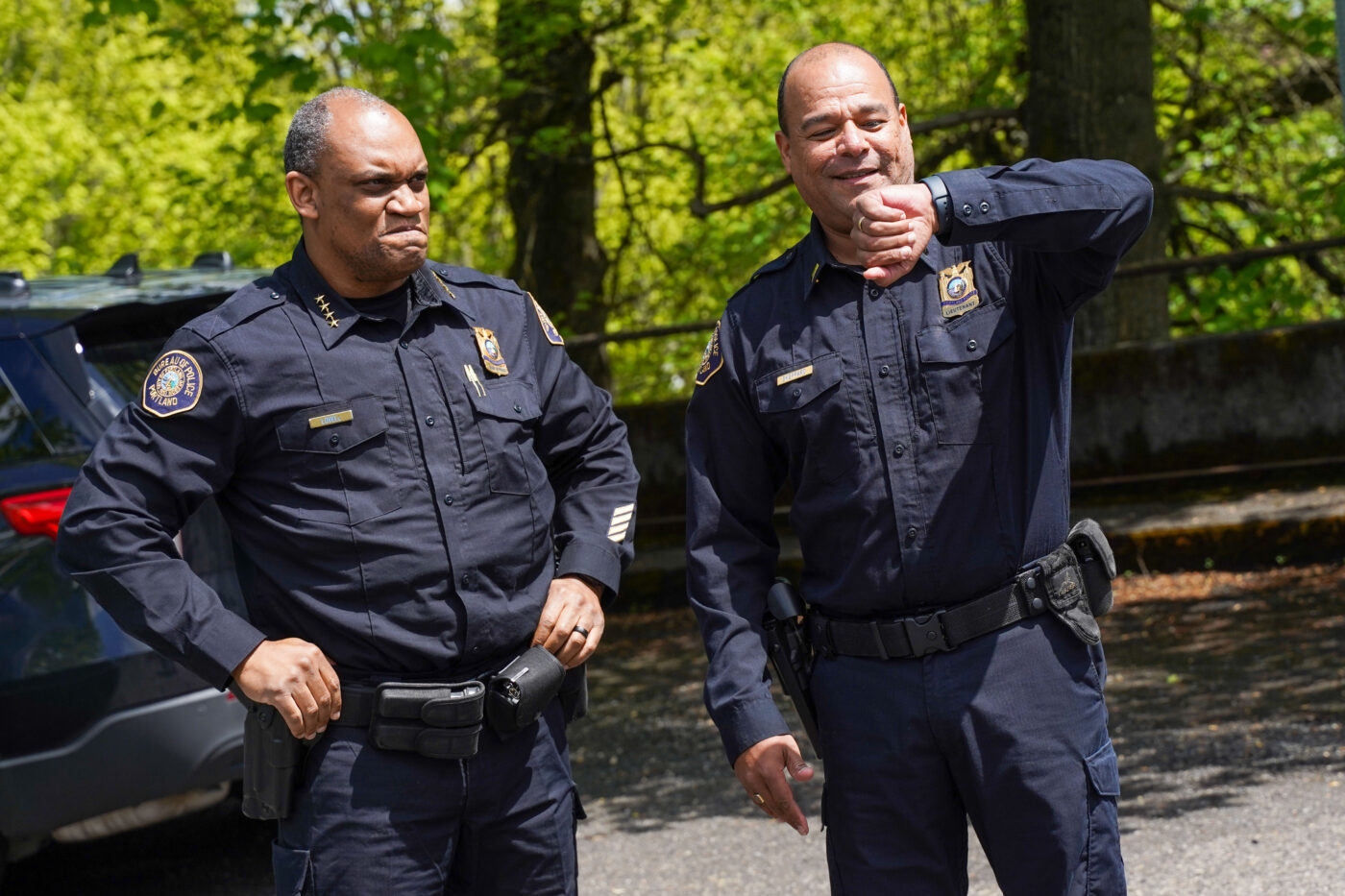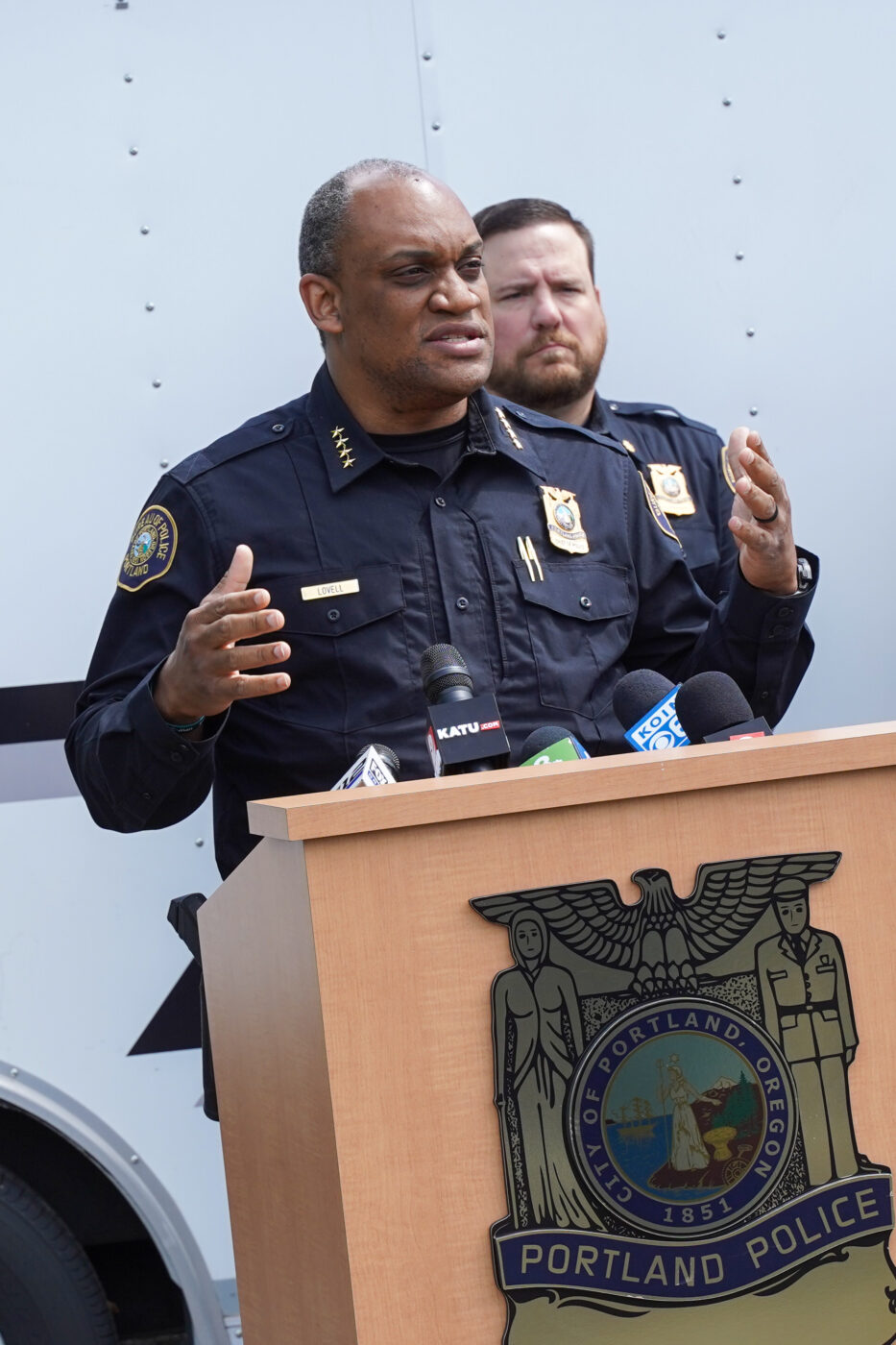

“We’re in a different time now. I think we’re moving away from some of the thoughts of 2020.
– Chuck Lovell, Chief of Police
What a difference a few years (and shifting political winds) makes. In the parking lot of a building where many arrests and protests took place just a few years ago, Portland Police Chief Chuck Lovell stood in front of a half-dozen officers and two motorcycles to announce a plan beef up enforcement of traffic laws.
It was a show of confidence and positive vibes from the PPB that would have been unheard of in 2020 or 2021.
“I’ve waited just over two years for this day,” Lovell beamed as he looked out at about a dozen reporters who came out to the Penumbra Kelly Building on East Burnside to hear the news. “Starting Thursday the 11th of May, we’ll be bringing back our traffic division… It’s a great day, it’s a day I’ve looked forward to for a long time.”
The new Traffic Division will hit the streets this Thursday with 10 motorcycle officers, two officers in patrol cars, and two sergeants. The officers will be split up into two groups that will cover the city seven days a week from 5pm until 3am. It will mean Portland will have a fully-staffed and dedicated Traffic Division for the first time in 27 months. By comparison, in 2008, before PPB began to reduct Traffic Division staff levels, they had about 35 motorcycle officers and 10 to 12 patrol car officers. Another detail offered today was that the division will be reevaluated every few months and PPB hopes to add officers as trainees become ready for duty.


Asked at the press conference if the current budget proposal from Mayor Ted Wheeler that will allow the PPB to hire 43 more police officers had anything to do with the announcement, Chief Lovell said no.
Lovell dissolved most of the Traffic Division in 2020 in what he called a “reorganization” that put officers back out into general patrol. It happened less than two months after the leader of the Portland Police Association, the union that represents PPB officers, warned that looming budget cuts would spell its demise. Some Portlanders, and at least one former city council member, said the move was a political ploy to show the consequence of reducing the police budget. It happened during a time of very heated emotions at City Hall and on the streets — emotions that have cooled way down.
When a reporter asked Lovell how he’d respond to folks who have concerns about racial profiling, Lovell said,
“We’re focused on driving behavior, not demographics, or things of that nature. We’re always as an organization looking to reduce disparities… And you know, we’re in a different time now. I think we’re moving away from some of the thoughts of 2020, and it’s more like, ‘Hey, we as a city really need certain things, and we miss certain things that have an impact on our lives when we don’t have them.’ And I think, you know, when we look back on the last couple of years, there’s many things that kind of fall into that category. And I think for a lot of people, traffic would be one of them.”
Today, Lovell said moving officers away from traffic enforcement came as a response to low staffing levels. But he also tamped down the idea that that issue is resolved. “I want to let people know we’re not making this move out of abundance, or an excess of officers,” he said. Moving officers into full-time traffic enforcement duty, he added, would have a negative impact on precincts. The primary reason for the move, he said, is to address a backlog of 97 trainees who need to learn traffic-related skills (like processing DUIs, traffic crashes, and so on) in order to move on in their training. Lovell also cited the upcoming Rose Festival as a reason he thinks now is the right time to make this shift. Traffic control is a big part of Rose Fest activities and PPB will beef up traffic officers even more for the one-month period of parades and other events.
“We’re really glad to see this.”
– Dylan Rivera, PBOT
The sole remaining motorcycle officer dedicated to traffic duties for the past two years has been Sgt. Ty Engstrom, who was the only other person to speak at today’s press conference. “We have speed racing events going on, we have fatal crashes that are setting record numbers each year… hundreds of citizen initiated traffic enforcement requests have gone unanswered. I didn’t have the resources to send officers to go and deal with those neighborhood complaints,” Sgt. Engstrom said.
The focus with the new officers will be DUIs, streets and intersections on the city’s high crash network, and what Engstrom referred to as, “dangerous driving behaviors.”
Two years ago Engstrom was at another press conference where he willingly broadcasted the fact that PPB had little to no traffic enforcement at all. I asked him today whether he thought that had an impact on driving behaviors. “Some of it is people just think they’re not going to get caught,” he acknowledged. “So yeah, absolutely, I think that all played a role. And we’re hoping that with your help, we can get the word out that we’re back. And we’re going to be out there as often as we possibly can.”
Dylan Rivera, a public information officer with the Portland Bureau of Transportation, also attended the press conference (although he was just there to listen and take notes as it appears there wasn’t coordination of the announcement with PBOT). “We’re really glad to see this,” Rivera said when I asked him the role of police in transportation safety. “And we are hopeful that this will help us kind of set a new trend, post-pandemic, of less traffic violence on the streets, less of the sort of lawlessness and dangerous driving people have seen during the pandemic.”
And unlike his predecessor Jo Ann Hardesty, PBOT Commissioner Mingus Mapps welcomes a larger police presence focused on traffic laws. “I am grateful that the traffic division is returning,” Mapps shared in an email to BikePortland today. “I have advocated for this since taking on the Bureau of Transportation. We have had record traffic-related fatalities in the last three years, and I hope this helps the current trend of lowering the rate.”


